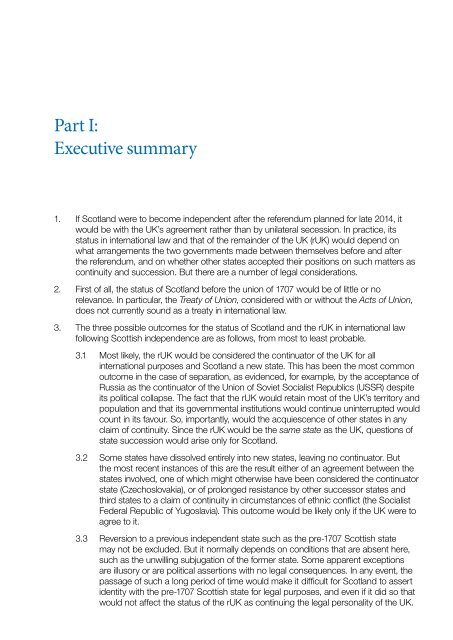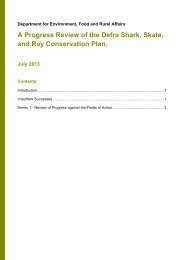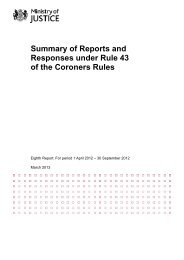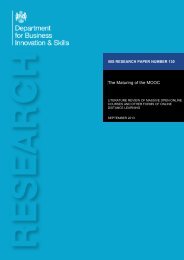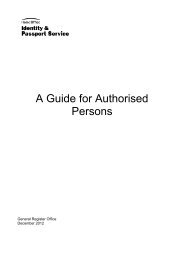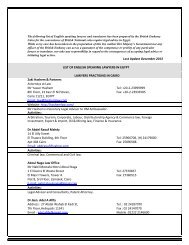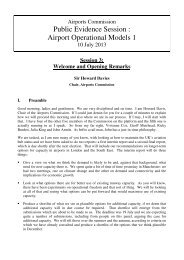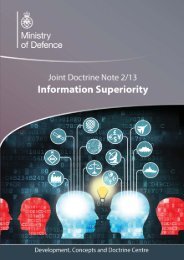Referendum on the Independence of Scotland ... - Gov.uk
Referendum on the Independence of Scotland ... - Gov.uk
Referendum on the Independence of Scotland ... - Gov.uk
You also want an ePaper? Increase the reach of your titles
YUMPU automatically turns print PDFs into web optimized ePapers that Google loves.
Part I:<br />
Executive summary<br />
1. If <strong>Scotland</strong> were to become independent after <strong>the</strong> referendum planned for late 2014, it<br />
would be with <strong>the</strong> UK’s agreement ra<strong>the</strong>r than by unilateral secessi<strong>on</strong>. In practice, its<br />
status in internati<strong>on</strong>al law and that <strong>of</strong> <strong>the</strong> remainder <strong>of</strong> <strong>the</strong> UK (rUK) would depend <strong>on</strong><br />
what arrangements <strong>the</strong> two governments made between <strong>the</strong>mselves before and after<br />
<strong>the</strong> referendum, and <strong>on</strong> whe<strong>the</strong>r o<strong>the</strong>r states accepted <strong>the</strong>ir positi<strong>on</strong>s <strong>on</strong> such matters as<br />
c<strong>on</strong>tinuity and successi<strong>on</strong>. But <strong>the</strong>re are a number <strong>of</strong> legal c<strong>on</strong>siderati<strong>on</strong>s.<br />
2. First <strong>of</strong> all, <strong>the</strong> status <strong>of</strong> <strong>Scotland</strong> before <strong>the</strong> uni<strong>on</strong> <strong>of</strong> 1707 would be <strong>of</strong> little or no<br />
relevance. In particular, <strong>the</strong> Treaty <strong>of</strong> Uni<strong>on</strong>, c<strong>on</strong>sidered with or without <strong>the</strong> Acts <strong>of</strong> Uni<strong>on</strong>,<br />
does not currently sound as a treaty in internati<strong>on</strong>al law.<br />
3. The three possible outcomes for <strong>the</strong> status <strong>of</strong> <strong>Scotland</strong> and <strong>the</strong> rUK in internati<strong>on</strong>al law<br />
following Scottish independence are as follows, from most to least probable.<br />
3.1 Most likely, <strong>the</strong> rUK would be c<strong>on</strong>sidered <strong>the</strong> c<strong>on</strong>tinuator <strong>of</strong> <strong>the</strong> UK for all<br />
internati<strong>on</strong>al purposes and <strong>Scotland</strong> a new state. This has been <strong>the</strong> most comm<strong>on</strong><br />
outcome in <strong>the</strong> case <strong>of</strong> separati<strong>on</strong>, as evidenced, for example, by <strong>the</strong> acceptance <strong>of</strong><br />
Russia as <strong>the</strong> c<strong>on</strong>tinuator <strong>of</strong> <strong>the</strong> Uni<strong>on</strong> <strong>of</strong> Soviet Socialist Republics (USSR) despite<br />
its political collapse. The fact that <strong>the</strong> rUK would retain most <strong>of</strong> <strong>the</strong> UK’s territory and<br />
populati<strong>on</strong> and that its governmental instituti<strong>on</strong>s would c<strong>on</strong>tinue uninterrupted would<br />
count in its favour. So, importantly, would <strong>the</strong> acquiescence <strong>of</strong> o<strong>the</strong>r states in any<br />
claim <strong>of</strong> c<strong>on</strong>tinuity. Since <strong>the</strong> rUK would be <strong>the</strong> same state as <strong>the</strong> UK, questi<strong>on</strong>s <strong>of</strong><br />
state successi<strong>on</strong> would arise <strong>on</strong>ly for <strong>Scotland</strong>.<br />
3.2 Some states have dissolved entirely into new states, leaving no c<strong>on</strong>tinuator. But<br />
<strong>the</strong> most recent instances <strong>of</strong> this are <strong>the</strong> result ei<strong>the</strong>r <strong>of</strong> an agreement between <strong>the</strong><br />
states involved, <strong>on</strong>e <strong>of</strong> which might o<strong>the</strong>rwise have been c<strong>on</strong>sidered <strong>the</strong> c<strong>on</strong>tinuator<br />
state (Czechoslovakia), or <strong>of</strong> prol<strong>on</strong>ged resistance by o<strong>the</strong>r successor states and<br />
third states to a claim <strong>of</strong> c<strong>on</strong>tinuity in circumstances <strong>of</strong> ethnic c<strong>on</strong>fict (<strong>the</strong> Socialist<br />
Federal Republic <strong>of</strong> Yugoslavia). This outcome would be likely <strong>on</strong>ly if <strong>the</strong> UK were to<br />
agree to it.<br />
3.3 Reversi<strong>on</strong> to a previous independent state such as <strong>the</strong> pre-1707 Scottish state<br />
may not be excluded. But it normally depends <strong>on</strong> c<strong>on</strong>diti<strong>on</strong>s that are absent here,<br />
such as <strong>the</strong> unwilling subjugati<strong>on</strong> <strong>of</strong> <strong>the</strong> former state. Some apparent excepti<strong>on</strong>s<br />
are illusory or are political asserti<strong>on</strong>s with no legal c<strong>on</strong>sequences. In any event, <strong>the</strong><br />
passage <strong>of</strong> such a l<strong>on</strong>g period <strong>of</strong> time would make it diffcult for <strong>Scotland</strong> to assert<br />
identity with <strong>the</strong> pre-1707 Scottish state for legal purposes, and even if it did so that<br />
would not affect <strong>the</strong> status <strong>of</strong> <strong>the</strong> rUK as c<strong>on</strong>tinuing <strong>the</strong> legal pers<strong>on</strong>ality <strong>of</strong> <strong>the</strong> UK.


